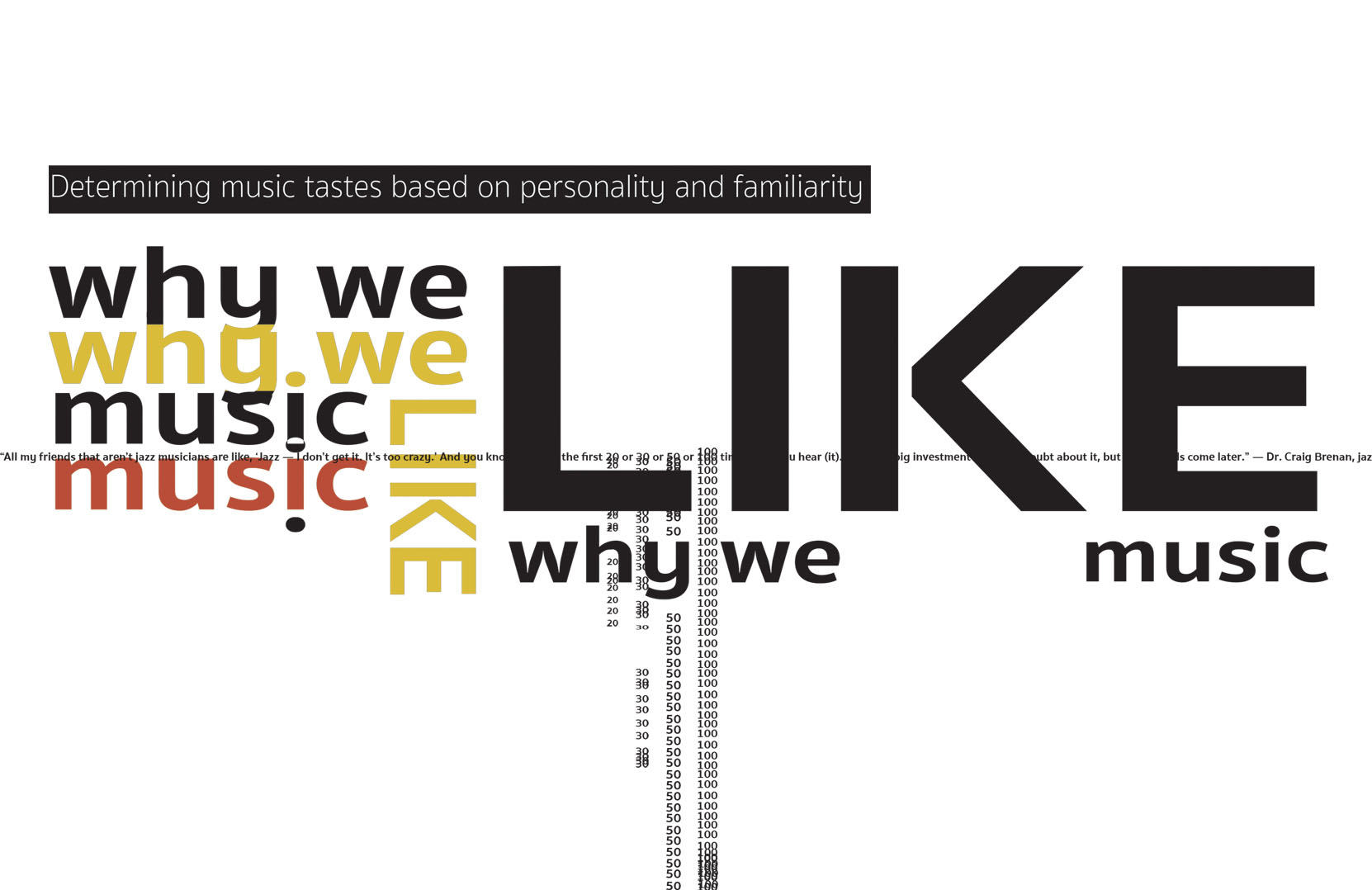Music is an innate part of our lives and our identities. It’s there for us when we want to escape, it’s there after a breakup, it’s there when we want to throw up our hands and dance, and, if we’re lucky, it’s there when we’re the first one to grab the aux cord in a friend’s car.
But what is it about music that’s so appealing, and why do certain genres draw us in while others have us plugging our ears in genuine horror?
Humour me for a second. Stop and listen. What song is running through your head as you read this? What music is playing in the background? What melody can you hear seeping out of the headphones of the person next to you on the bus?
The music we listen to says so much about our personalities, and we feel (or at least I do) that a glance through our Spotify or Apple Music collections would be enough to shed some light on who we are to a total stranger. In some ways, we even use music preferences to pit people against each other and gauge their compatibility, like others do with Zodiac signs.
“When you ask people ‘why do you listen to music?’ almost always, they talk about emotion in their answers,” says Dr. Kathleen Corrigall, an associate professor of psychology at MacEwan University. People use music to modify or match their emotions, to feel good and to feel better, explains Corrigall. “It does a bit of a better job…at helping us work through our emotions and express our emotions then maybe language does.”
But music is more than just chord progressions and rhythms — it’s a cultural movement. Dr. Craig Brenan, a jazz musician and professor of music at MacEwan, explains that genres like hip hop and pop are cultural movements which can influence our identities, the friends we choose, and even what we choose to wear in the morning. “I’m not sure that I could come to work dressed as ‘80s hair metal,” says Brenan with a laugh, “but I think that’s what people are really connecting with as well; yes, they love the music, but they also love the cultural movement behind it.”
Finding the music that resonates with us comes down to a few factors. Personality certainly plays a role in determining what music genres we like; countless studies have been undertaken to demonstrate the link between personality and music genre. For example, Dunn, de Ruyter, and Bouwhuis found that extroverted personalities tend to enjoy pop, dance, and rap genres, and people who exhibit high amounts of a trait called “openness to experience,” which Corrigall says refers to people who like variety over routine and enjoy life-long learning, are more likely to appreciate genres like jazz.
Our taste in music is also inevitably influenced by the songs we listened to growing up. Corrigall explains that we experience something called a Reminiscence Bump, a phenomenon where as adults, we have more clear memories from our teen years up until our 30s. This extends into music as well. “You look at peoples’ music, what they’re familiar with and what they like, (and) they tend to show this Reminiscence Bump where they like a lot of music that was popular (when they were) between the ages of 10 and 30, especially in those teen years and early 20s,” says Corrigall.
Another factor that contributes to our music tastes is simply familiarity.
“We tend to have a sweet spot for what we like in terms of how familiar that music is to us, and also how complex that it seems to us as well,” explains Corrigall. This is known as the Mere-Exposure Effect: The more we are exposed to something, in this case a song, the easier it is to enjoy it.
“But if we’re completely unfamiliar with a piece of music and it’s using beat structures we’re not familiar with and pitch structures we’re not familiar with, we’re not really likely to like that music,” says Corrigall. “We’re not really sure how to process it.”
This helps explain why “complex genres” like classical music and jazz are often sidelined: They take more time to understand and appreciate. It’s nearly impossible to dive into a two-hour symphony as an entry into classical music and come up for air with a complete understanding of the piece. As Brenan explains: “There’s a learning curve.”
“All my friends that aren’t jazz musicians are like, ‘Jazz — I don’t get it. It’s too crazy.’ And you know, it is, for the first 20 or 30 or 50 or 100 times that you hear (it),” says Brenan. “There’s a big investment there, no doubt about it, but the rewards come later and that’s something that jazz fans know.”
He notes that the society that we live in is fed by immediacy. If some- thing doesn’t reveal itself right away or is a little tougher to grasp, it’s easier just to move on and listen to something that is guaranteed to get our toes tapping.
Brenan explains that one of his favourite pieces of classical music, Gorecki’s “Symphony of Sorrowful Songs,” has an introduction that is nine minutes long. When you can listen to three other songs in that timeframe, songs guaranteed to be easier to “get” and catchier to listen to, it’s even harder to give classical music a shot.
Even Brenan admits: “In my own daily life, nine minutes of pure listening — I have to plan that. I have to work on making sure I have nine full minutes just to finish the introduction of this piece of classical music that I really love. And I don’t know if we really do that in society anymore.”
What we do strive towards in society is creating a sense of connection with others — a shared experience — and music is the perfect way to do that. We make playlists for people we love, people we want to love, and force our favourite artists’ songs on best friends, siblings — even the barista at Starbucks.
With that drive for shared experience comes an almost unanimous desire to know what other people are listening to and to know what genres are trendy. “It’s not uncommon for the masses to all of a sudden like a certain genre of music,” says Brenan. “For a while there it was Mumford and Sons and everything with a banjo — really trendy, right? And then it was Coldplay (with) all those spacey long tones… all these long melodies, and then Bon Iver came out (with) these gentle pieces.” “So we definitely ping pong back and forth and back and forth between all these styles (and) we tend to move as a group in society as to what we like,” continues Brenan.
As much as music fosters connection, it can also be very polarizing. Music is used just as much to compare yourself to others. Why else does Spotify Wrapped exist? There’s a badge of honour that comes with posting your Spotify Wrapped — proclaiming to all your indifferent followers that you spend all your time blasting “Easy On Me” or listening to Shania Twain.
Our music preferences are based on so many different factors that it’s almost irrelevant to compare ourselves to others and judge their music tastes as being “less sophisticated” than our own. Music is important to everyone, and we should take care to remember that.
If you want to expand your music tastes, great! Let Spotify recommend a piece of classical string quartet, or big band, or maybe even a roster of pop songs you generally avoid. But if you want to keep playing the familiar music that is near and dear to your heart, that’s great too!
There’s no right or wrong answer with music. Whether you choose music based on its intellectual capacity or based on the weirdest band names you can find, your choices are valid. If you enjoy it, don’t let anyone tell you otherwise.





0 Comments